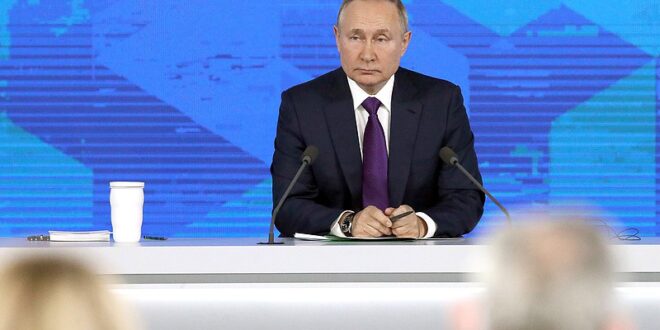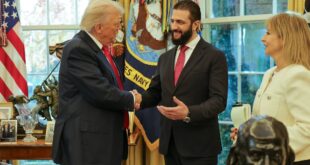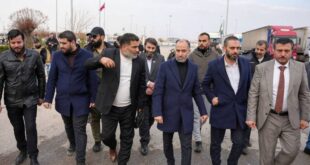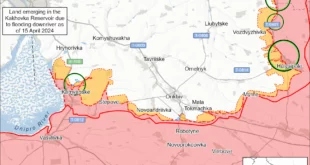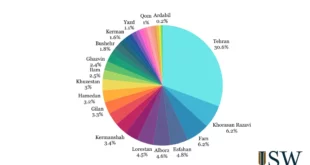The main constraints on Russia’s invasion of Ukraine were never the threat of Western sanctions or intelligence-based exposure of its preparations. In retrospect, even the negotiations between Russia and the West look like theatre. The real constraints were domestic and geopolitical: Russia’s domestic stability and its place in the future global order. One assumed that President Vladimir Putin would weigh his obsession with Ukraine against these other needs. But he did not: he prioritised Ukraine over everything else. This gamble will cause a dramatic shift in Russia’s domestic development and geopolitical prospects.
President Vladimir Putin’s growing obsession with Ukraine has developed over many years. In 2005 he referred to the recapture of Crimea as a ridiculous idea – an irresponsible step that would open a Pandora’s box of historical grievances. But, nine years later, he would do exactly that. By summer 2021, he was denying the existence of Ukrainians as a people separate from Russians. Early this week, he declared the Ukrainian state illegitimate.
This growing obsession may partly originate in Putin’s disillusionment with the West – which is also traceable in his statements over the years. But, above all, this is a personal development. It may have something to do with ageing, which can make events of long ago feel recent, a sense of mission stronger, and the time for action ever shorter. This passion of Putin’s is not shared by Russia’s wider policymaking or business elite, let alone Russian society as a whole.
One could argue that, since last autumn, the key question of European security has concerned the balance in Putin’s mind between this personal obsession and the Russian national interest. Which would carry the day? Would Putin try to control Ukraine to the extent that he could achieve through talks with the West? Or would he try to create facts on the ground that would ensure Ukraine’s dependence on Russia was lasting and irreversible? In the latter case, there was no diplomatic settlement for the West to achieve.
It seemed that Russia’s geopolitical interests would call for a diplomatic solution. By upending its relationship with the West through a full-scale invasion of Ukraine, Russia would inevitably drift further into China’s orbit. This should not have been in Moscow’s interest. Rather, it seemed clear that Moscow enjoyed being on speaking terms with both Washington and Beijing – as this enhanced its influence on both of them, created space for hedging, and formed a good basis for cultivating relationships and acting as a power broker in countries across the Middle East and Africa. Russia’s foreign policy elite feared the prospect of China’s takeover of Taiwan exactly because this would have created the kind of bipolar world order that made such balancing untenable.
Furthermore, Russia’s ‘heavy-metal’ diplomacy – its use of military threats to force the West to discuss topics it did not want to discuss – was working. US President Joe Biden had offered to discuss some arms control measures with Putin, there was new diplomatic energy around the Minsk agreement, and some form of tacit agreement to ensure Ukraine would not join NATO seemed plausible. Of course, the means were ugly: Russia had taken Ukraine hostage, held a gun to its head, and dictated terms to the West, which had no other way to defend Ukraine that it felt was acceptable. Still, Moscow had opened a path that – with time, patience, and diplomatic seriousness – could have allowed it to achieve at least some of its goals.
In addition, there was a domestic situation characterised by one feeling above all others: tiredness. Russian society is exhausted with the political status quo, even though it lacks the means and energy to change it. Russian elites – who had been expecting signs of renewal at the top ever since the 2018 presidential election – were equally tired and demoralised. An all-out war with Ukraine was never going to be popular in Russia; instead of boosting Putin’s popularity as the 2014 annexation of Crimea did, it is a huge stress test for the entire political system and the domestic stability Putin values so highly.
One can only speculate about whether the negotiations with Western leaders were always just a smokescreen to buy time until the Russian military was ready for war or were part of an attempt to see what could be gained through diplomacy. In the latter case, we also do not know what made Putin eventually decide against the diplomatic path. For now, only one thing is clear: Putin prioritised his personal obsession above Russia’s interests. And he likely did so almost singlehandedly: the broadcast earlier this week of a meeting of the Security Council showed a series of visibly fearful officials trying to come up with statements they thought were expected of them. None of it suggested that many of them were consulted in advance.
The invasion marked the beginning of a new era for not just the European security order but also Russian society. The domestic system will become even more authoritarian; the government will increasingly stifle public debate. More independent and creative Russians will leave elite circles; more will emigrate. The state’s capacity for good governance will decrease; tiredness and hidden protest will grow. It will be a long time before this process saps Russia’s vitality enough to manifest in true changes, but it is safe to say that Putin has planted a bomb under his personalised system of governance.
Meanwhile, the European security order will once again be shaped by open confrontation. On a certain level, this may have a silver lining. The attempts to adhere to concepts of a bygone era – be it ‘Europe from Lisbon to Vladivostok’ or ‘each country has the right to choose its alliances’ have prevented Europeans from taking a clear-eyed view of reality and defending their interests in the world as it is, not as they wish it to be. But this is also a contest in which the outcome is far from certain. As a colleague recently put it, the West may be discussing how to isolate Russia, but Russia is working to isolate the West – and may believe that it is succeeding. It will take clever prioritisation, investment of resources, and diplomacy to prove Russia wrong on that score.
 Eurasia Press & News
Eurasia Press & News
